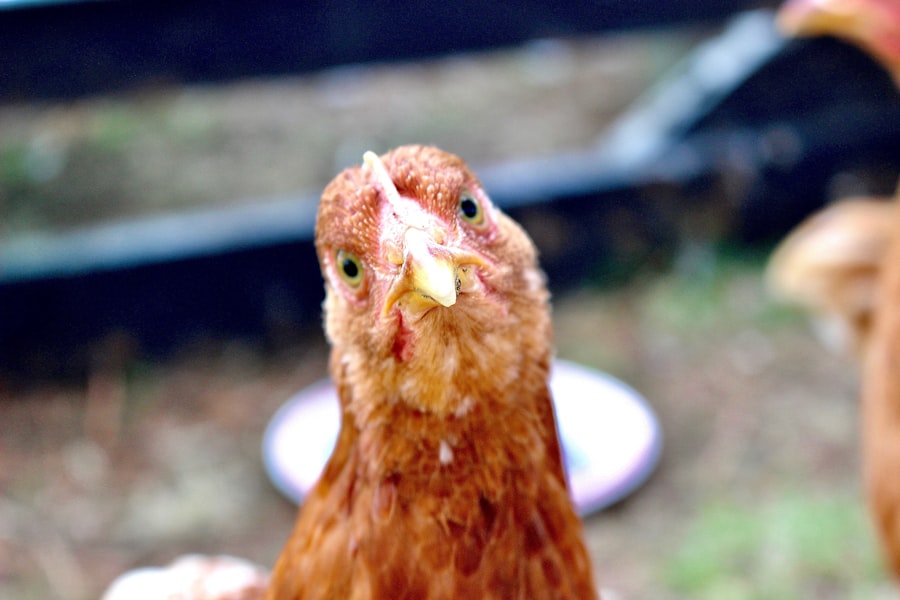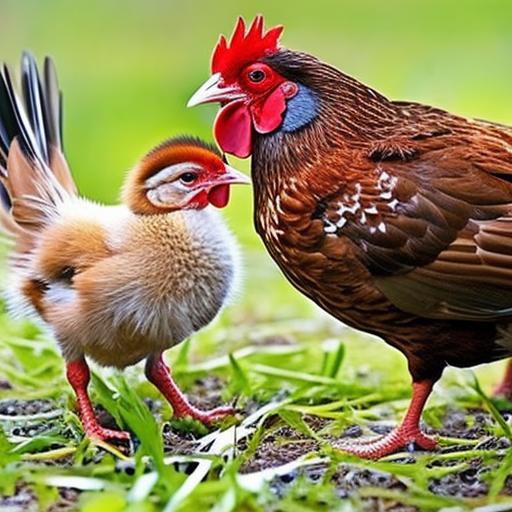Raising chickens in your backyard has become an increasingly popular trend in recent years. Not only does it provide a sustainable source of fresh eggs, but it also offers a range of other benefits. Urban chicken keeping has gained traction as more people are becoming interested in self-sufficiency and sustainable living. In this article, we will explore the various aspects of raising chickens in your backyard, from choosing the right breed to building a chicken coop and maintaining a healthy environment for your feathered friends.
Key Takeaways
- Raising chickens in your backyard can provide numerous benefits, including fresh eggs, natural pest control, and a fun hobby for the whole family.
- When choosing a breed of chicken, consider factors such as egg production, temperament, and climate adaptability.
- Building a chicken coop requires careful planning and attention to details such as ventilation, predator-proofing, and adequate space for your birds.
- Maintaining a clean and healthy coop involves regular cleaning, proper waste management, and monitoring for signs of illness or disease.
- Feeding and watering your chickens requires a balanced diet of commercial feed, fresh water, and occasional treats, while also avoiding common hazards such as moldy or spoiled food.
Benefits of Keeping Chickens in Your Backyard
One of the primary benefits of keeping chickens in your backyard is the abundance of fresh eggs they provide. There is nothing quite like collecting eggs from your own flock and enjoying them for breakfast. Not only are they delicious, but they are also packed with nutrients and have a richer taste compared to store-bought eggs.
Another advantage of having chickens is their natural pest control abilities. Chickens love to forage and scratch the ground, which helps to control insects and pests in your yard. They eat bugs, slugs, and even small rodents, reducing the need for chemical pesticides.
Chickens also produce high-quality fertilizer for your garden. Their droppings are rich in nitrogen, phosphorus, and potassium, which are essential nutrients for plants. By allowing your chickens to roam freely in your yard or using their droppings as compost, you can improve the health and productivity of your garden.
Choosing the Right Breed of Chicken for Your Family
When it comes to choosing the right breed of chicken for your family, there are several factors to consider. Different breeds have different characteristics, such as egg-laying ability, temperament, and size.
If you are primarily interested in egg production, then you may want to consider breeds such as Rhode Island Reds or Leghorns. These breeds are known for their high egg production rates and can provide you with a steady supply of fresh eggs.
On the other hand, if you have children and are looking for a friendly and docile breed, then you may want to consider Orpingtons or Silkies. These breeds are known for their calm and gentle nature, making them great pets for families with young children.
It’s also important to consider the size of your backyard and the climate in your area. Some breeds, such as Bantams, are smaller in size and require less space compared to larger breeds like Plymouth Rocks or Sussex. Additionally, certain breeds are better suited for colder climates, while others thrive in warmer regions.
Building a Chicken Coop: Tips and Tricks
A well-built chicken coop is essential for the health and safety of your chickens. It provides them with shelter from the elements, protection from predators, and a comfortable place to roost and lay eggs.
When building a chicken coop, it’s important to choose the right location. The coop should be situated in an area that receives plenty of sunlight but is also protected from strong winds. It should be elevated off the ground to prevent flooding and provide good drainage.
The materials used for the coop should be sturdy and predator-proof. Consider using hardware cloth instead of chicken wire for the walls and windows to prevent predators from gaining access. The roof should be waterproof and sloped to allow rainwater to drain away.
The size of the coop will depend on the number of chickens you plan to keep. As a general rule of thumb, each chicken should have at least 4 square feet of space inside the coop and 10 square feet in the outdoor run.
Maintaining a Clean and Healthy Chicken Coop
Maintaining a clean and healthy chicken coop is crucial for the well-being of your flock. A dirty coop can lead to various health issues, such as mites, lice, and respiratory infections.
Regular cleaning is essential to prevent the buildup of droppings and other waste. Remove soiled bedding and replace it with fresh bedding at least once a week. Scrub the walls, perches, and nesting boxes with a mild detergent and rinse thoroughly.
It’s also important to provide proper ventilation in the coop. Good airflow helps to prevent the buildup of ammonia from chicken droppings, which can be harmful to your chickens’ respiratory system. Install windows or vents that can be opened and closed as needed.
Additionally, consider using natural remedies to control pests in the coop. Diatomaceous earth can be sprinkled in the coop and nesting boxes to deter mites and lice. Herbs such as lavender, mint, and rosemary can also be planted around the coop to repel insects.
Feeding and Watering Your Chickens

Proper nutrition is essential for the health and productivity of your chickens. A balanced diet ensures that they receive all the necessary vitamins, minerals, and protein they need.
Commercial chicken feed is readily available and provides a complete and balanced diet for your flock. Look for feeds that are specifically formulated for the age and type of chickens you have. Chickens under 16 weeks old require a higher protein content compared to adult chickens.
In addition to commercial feed, you can supplement your chickens’ diet with kitchen scraps, fruits, vegetables, and grains. However, it’s important to avoid feeding them anything toxic or harmful, such as chocolate, onions, or avocado.
Fresh water should always be available for your chickens. Make sure to clean and refill their water containers daily to prevent contamination. During hot weather, consider adding ice cubes or frozen water bottles to keep the water cool.
Keeping Your Chickens Safe from Predators
Predators can pose a significant threat to your chickens, especially if you live in an area with a high population of raccoons, foxes, or coyotes. It’s important to take measures to protect your flock and keep them safe.
One of the most effective ways to keep predators out is by using fencing. A sturdy fence with small gaps or buried wire mesh can prevent predators from digging under or climbing over. Make sure the fence is at least 6 feet high to deter larger predators.
Locking the coop at night is also crucial. Predators are most active during the night, so make sure to securely close and lock all doors and windows. Consider using locks or latches that are predator-proof, such as carabiners or padlocks.
Other deterrents, such as motion-activated lights or noise-making devices, can also be effective in scaring away predators. Additionally, removing any potential hiding spots around the coop, such as tall grass or brush piles, can help to deter predators.
Collecting and Using Fresh Eggs
One of the joys of raising chickens is collecting fresh eggs from your own flock. Not only are they delicious, but they also have a richer taste compared to store-bought eggs.
When collecting eggs, it’s important to handle them with care to prevent cracking or contamination. Gently pick up the eggs and place them in a clean basket or egg carton. Avoid washing the eggs unless absolutely necessary, as this can remove the protective bloom that helps to keep them fresh.
Fresh eggs can be stored in a cool and dry place for up to a month. However, it’s best to use them within two weeks for optimal freshness and flavor. To check if an egg is still fresh, you can perform the float test. Place the egg in a bowl of water – if it sinks to the bottom and lays flat, it is fresh; if it stands upright or floats, it is no longer fresh and should be discarded.
Fresh eggs can be used in a variety of ways in cooking and baking. They can be scrambled, fried, boiled, or used as an ingredient in cakes, cookies, and other baked goods. The possibilities are endless!
Teaching Children Responsibility through Chicken Care
Raising chickens can be a great way to teach children about responsibility and the importance of caring for animals. Involving children in the care of chickens can help them develop a sense of empathy and learn valuable life skills.
Children can be assigned tasks such as collecting eggs, feeding the chickens, and cleaning the coop. These tasks can be done under adult supervision to ensure safety and proper handling of the chickens.
By involving children in chicken care, they will learn the importance of consistency and routine. They will also develop a sense of pride and accomplishment as they see their efforts contribute to the well-being of the flock.
Troubleshooting Common Chicken Issues and Concerns
As with any pet or livestock, there may be times when you encounter issues or concerns with your chickens. It’s important to be prepared and know how to troubleshoot common problems.
One common issue that chicken owners face is egg-laying problems. This can include issues such as soft-shelled eggs, shell-less eggs, or a decrease in egg production. These problems can be caused by various factors, such as poor nutrition, stress, or age. By ensuring that your chickens have a balanced diet, a comfortable environment, and regular veterinary check-ups, you can help to prevent these issues.
Health issues can also arise in chickens, such as respiratory infections or parasites. It’s important to monitor your flock regularly for any signs of illness or distress. If you notice any abnormal behavior or symptoms, such as coughing, sneezing, or lethargy, it’s best to consult a veterinarian who specializes in poultry health.
Raising chickens in your backyard can be a rewarding and fulfilling experience. Not only do they provide fresh eggs and natural pest control, but they also offer an opportunity to teach children about responsibility and sustainable living.
By choosing the right breed, building a well-designed coop, and providing proper care and nutrition, you can create a healthy and happy environment for your flock. Remember to take precautions to protect your chickens from predators and to maintain a clean and hygienic coop.
If you are considering raising chickens in your backyard, I encourage you to give it a try. The benefits far outweigh the challenges, and you will be rewarded with fresh eggs, a closer connection to nature, and the satisfaction of knowing that you are contributing to a more sustainable lifestyle. Share your own experiences or tips in the comments section below!
If you’re considering keeping chickens as pets, it’s important to have a comprehensive understanding of their breeding and care. One crucial aspect is knowing how long it takes for chicken eggs to hatch naturally. This informative article from Poultry Wizard provides valuable insights into the incubation period and factors that can affect it. Understanding this process will help you plan and prepare for the arrival of adorable baby chicks. For more information on breeding chickens, check out this helpful resource: How Long for Chicken Eggs to Hatch Naturally. Additionally, if you’re interested in learning about quail breeding, Poultry Wizard also offers an article on whether quails sit on their eggs: Do Quails Sit on Their Eggs?. Lastly, if you’re wondering where to place your chicken coop, this guide will provide you with essential tips: Where to Put Chicken Coop. Happy chicken keeping!
FAQs
What are the benefits of keeping chickens?
Keeping chickens can provide a source of fresh eggs, fertilizer for gardens, and entertainment for the whole family. Chickens can also help control pests in the yard and provide a sense of self-sufficiency.
What do chickens need to be healthy and happy?
Chickens need a clean and safe coop to sleep in, access to fresh water and food, and a secure outdoor area to roam and scratch. They also need protection from predators and regular health check-ups.
What kind of food do chickens eat?
Chickens eat a diet of grains, seeds, and insects. They also need access to grit, which helps them digest their food. It is important to provide a balanced diet and avoid feeding them foods that are harmful to their health.
How often do chickens lay eggs?
The frequency of egg-laying depends on the breed of chicken and their age. Most chickens will lay eggs every 1-2 days during their peak laying period, which is typically between 6-18 months of age.
What are some common health issues that chickens may face?
Chickens may face health issues such as respiratory infections, parasites, and egg-laying problems. It is important to monitor their health and seek veterinary care if necessary.
What are some safety precautions to take when keeping chickens?
It is important to keep chickens away from children and pets, as they can carry harmful bacteria. Chickens should also be protected from predators and provided with a safe and secure coop. Additionally, it is important to follow proper food handling and egg collection procedures to prevent the spread of disease.
Meet Walter, the feathered-friend fanatic of Florida! Nestled in the sunshine state, Walter struts through life with his feathered companions, clucking his way to happiness. With a coop that’s fancier than a five-star hotel, he’s the Don Juan of the chicken world. When he’s not teaching his hens to do the cha-cha, you’ll find him in a heated debate with his prized rooster, Sir Clucks-a-Lot. Walter’s poultry passion is no yolk; he’s the sunny-side-up guy you never knew you needed in your flock of friends!







